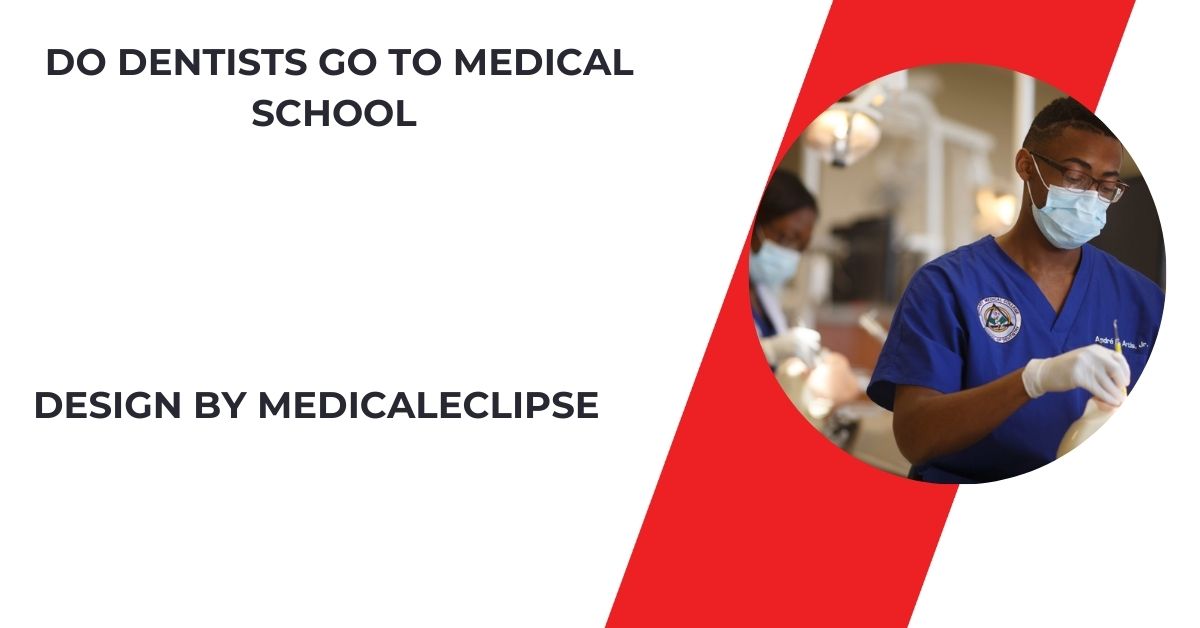No, dentists attend dental school, not medical school. Dental school focuses on oral health, while medical school covers overall body health.
In this article, we’ll explore the educational requirements for dentists, the differences between dental school and medical school, and why dentists do not attend medical school.
Understanding Dental School vs. Medical School:

Both dentists and doctors undergo extensive education, but their academic focus is vastly different. Medical school focuses on training doctors who are experts in diagnosing and treating a wide range of health conditions affecting the entire body. On the other hand, dental school is focused solely on oral health, providing dentists with specialized knowledge and skills required for patient care in the dental field.
Medical School: A Broad Focus on Human Health
Medical school prepares students to become medical doctors (MDs) or doctors of osteopathic medicine (DOs). The program covers general anatomy, biology, pharmacology, pathology, and medical ethics, with a focus on diagnosing diseases and understanding bodily systems. Medical students receive training in various specialties, such as surgery, pediatrics, cardiology, and emergency care, before choosing a specific area of practice. After medical school, doctors undergo several years of residency to gain hands-on experience in their chosen field.
Dental School: Specializing in Oral Health
Dental school, in contrast, focuses on the oral cavity, which includes the teeth, gums, and related structures. Students in dental school learn about dental anatomy, diagnosis of oral diseases, restorative procedures, orthodontics, and preventive care. While dental school education shares some similarities with medical school (such as studying basic human anatomy and biology), the curriculum is tailored to dentistry. Dental students also receive significant clinical training, where they perform procedures like fillings, cleanings, and extractions under the supervision of experienced instructors.
Also Read: Does Queen Medical Is Covered By Tripler – Find Out Here!
Duration of Study
- Medical School: Medical school typically takes four years to complete after obtaining a bachelor’s degree. Afterward, doctors spend an additional 3–7 years in residency, depending on their specialty.
- Dental School: Dental school also takes four years after a bachelor’s degree. There is no residency required for most general dentists, although those who specialize in areas like oral surgery or orthodontics may undergo additional training.
Curriculum Comparison:
| Feature | Medical School | Dental School |
| Duration | 4 years of medical school + 3-7 years of residency | 4 years of dental school |
| Core Subjects | Anatomy, biology, pathology, pharmacology, surgery | Dental anatomy, oral diseases, restorations, orthodontics |
| Clinical Training | Hands-on work with patients, focusing on diagnosing and treating diseases of the body | Clinical training in dental procedures, including cleanings, fillings, and extractions |
| Residency | Required for specialization | Not required, except for certain specialties |
Do Dentists Attend Medical School?
The simple answer is no, dentists do not attend medical school. They attend dental school, which is a separate, specialized program focused exclusively on training students in the field of dentistry. However, the confusion often arises because both careers require a similar academic foundation, and both dentists and medical doctors are healthcare professionals responsible for patient care.
Despite these similarities, the paths they follow after obtaining a bachelor’s degree are different. Dentists are trained to treat oral health issues, while doctors are trained to address a broad range of medical conditions affecting the whole body.
Why Don’t Dentists Go to Medical School?

The main reason dentists do not go to medical school is that the two professions require very different areas of expertise. Dentistry focuses specifically on oral health, which includes teeth, gums, and related structures. The practice of dentistry requires specialized training in diagnosing oral diseases, performing dental procedures, and managing patient care within a dental setting.
On the other hand, medical school trains students in understanding the entire human body, with a broad focus on systemic health. While there is some overlap (e.g., studying anatomy), the depth of knowledge and the types of treatments differ significantly.
For instance, while both dentists and doctors need to understand general anatomy, doctors must also learn about complex diseases such as cancer, diabetes, and heart disease, while dentists focus on conditions like tooth decay, gum disease, and jaw disorders. Thus, the educational requirements for each profession are designed to cater to their specific field of healthcare.
The Educational Path to Becoming a Dentist:
The road to becoming a dentist typically involves the following steps:
Step 1: Obtain a Bachelor’s Degree
Before attending dental school, prospective dentists must first complete a bachelor’s degree, often in a science-related field like biology, chemistry, or pre-dentistry. The undergraduate program typically lasts four years and includes coursework in subjects such as biology, chemistry, physics, and anatomy. Dental schools require applicants to have completed specific prerequisite courses in order to apply.
Step 2: Apply to Dental School
After obtaining a bachelor’s degree, students can apply to dental school. Admission to dental school is highly competitive, and applicants must often take the Dental Admission Test (DAT), which assesses knowledge in areas like biology, chemistry, and perceptual ability. Dental school typically lasts four years and is divided into two phases:
- Years 1-2: The first two years of dental school focus on classroom-based learning, where students study subjects like dental anatomy, biochemistry, microbiology, and pharmacology. Students also begin to learn basic clinical skills.
- Years 3-4: The final two years are dedicated to hands-on clinical training. Students treat patients under the supervision of faculty, performing procedures like fillings, crowns, root canals, and extractions.
Also Read: PCN Medical Abbreviation – Exploring Its Multiple Uses!
Step 3: Obtain a Dental License
After graduating from dental school, dentists must pass national and state exams to obtain a license to practice dentistry. The National Board Dental Examinations (NBDE) is a key component of the licensing process, followed by a clinical exam to assess practical skills.
Step 4: Consider Specialization (Optional)
While most dentists practice general dentistry, some choose to specialize in areas like orthodontics, periodontics, or oral surgery. Specialization typically requires additional years of education and clinical training, which may resemble the type of residency training medical doctors undergo.
Can Dentists Become Medical Doctors?
While the paths to becoming a dentist and a medical doctor are different, it is possible for a dentist to transition into a medical career. Some dentists who are interested in expanding their scope of practice or pursuing a medical specialty choose to apply to medical school after completing dental school.
However, becoming a medical doctor after dental school is a lengthy and challenging process. Dentists who decide to pursue this route must meet all of the admissions requirements for medical school, including taking the MCAT (Medical College Admission Test), completing medical school (which typically takes an additional four years), and completing a residency program in their chosen medical field.
Is This Common?
Becoming both a dentist and a doctor is relatively uncommon. The dual pursuit of both degrees requires an immense amount of time, dedication, and financial investment. Most dentists are content with their specialized training in oral health, while doctors focus on broader medical conditions affecting the entire body. However, some dentists may pursue a second career in medicine due to personal interest or career goals.
Key Differences Between Dentists and Doctors:
While dentists and doctors both work in healthcare, there are some significant differences between the two professions:
- Education Focus: Dentists focus on oral health, while doctors study and treat a broader range of diseases and conditions affecting the body.
- Training Duration: Dentists spend four years in dental school, while doctors spend four years in medical school plus additional years in residency.
- Clinical Practice: Dentists perform dental procedures like cleanings, fillings, extractions, and surgeries related to oral health, while doctors diagnose and treat conditions affecting the entire body.
FAQ’s
- Do dentists attend medical school?
No, dentists attend dental school, which specializes in oral health.
- What’s the main difference between dental school and medical school?
Dental school focuses on oral health, while medical school covers the entire body’s health.
- Can a dentist become a doctor?
Yes, but it requires applying to and completing medical school after dental school.
- How long does it take to become a dentist?
It typically takes 8 years: 4 years for a bachelor’s degree and 4 years for dental school.
- Do dentists require residency training
Most general dentists don’t, but specialists may undergo additional training similar to a residency.
Conclusion
Dentists attend dental school, not medical school. Dental school specializes in oral health, while medical school focuses on broader health concerns. Both paths require rigorous education, but they diverge after a bachelor’s degree. Dentistry offers a rewarding career in oral care, with many growth opportunities. Understanding these differences helps choose the right healthcare career path.

Leave a Reply